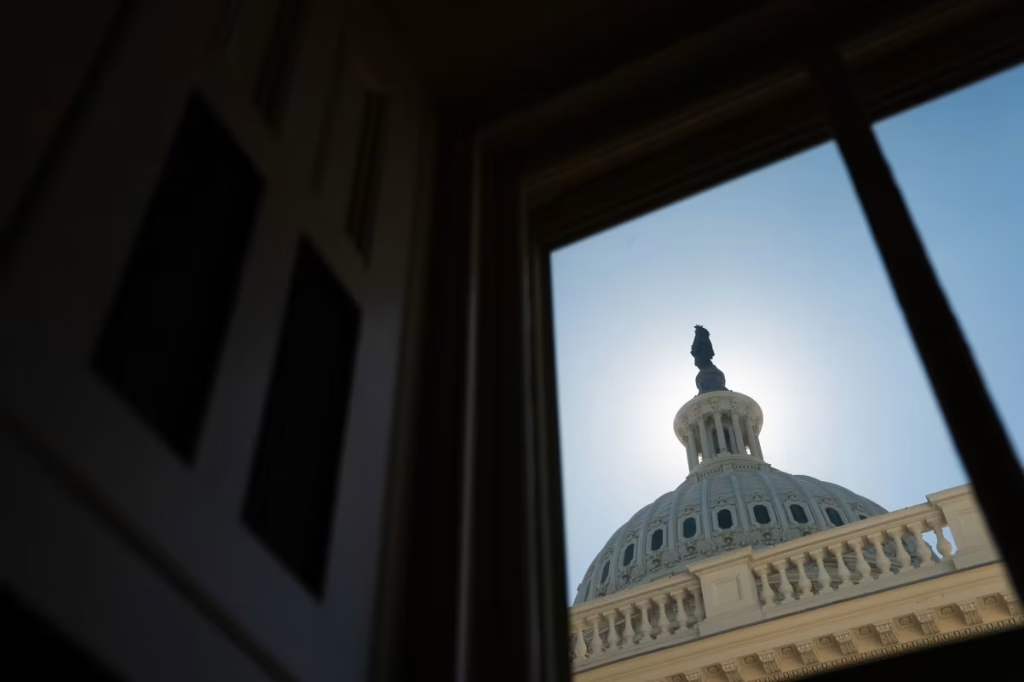GOP is springing leaks in its shutdown strategy

At the start of the government shutdown last week, it was Democrats who looked like they wouldn’t be united. Right off the bat, they lost the votes of three members of their Senate caucus. They had folded just before the last shutdown, and it was an inauspicious start to this one.
A lot can change in a week.
Yes, those three members continue to vote with Republicans. But otherwise, it’s largely Republicans who are springing leaks in their shutdown strategy.
Repeatedly in recent days, GOP members have stepped forward and undermined their side’s negotiating posture on key issues.
These voices are largely coming from the House, which has already passed a Republican-led short-term funding bill, whereas the Senate is where the action is right now. But their comments run counter to the party’s messaging as Senate Republicans still need several more Democrats to sign onto the package.
Most prominent among them is Rep. Marjorie Taylor Greene, who seems to be basking in sticking it to her party leaders right now. Starting with her comments Monday signaling her support for Democrats’ policy demand – an extension of enhanced Obamacare tax credits – the Georgia congresswoman has unleashed a torrent of unhelpful comments for GOP leaders.
While GOP leaders have said they’ll negotiate on Obamacare after Democrats vote to reopen the government, Greene has basically argued: Why wait?
She’s also suggested GOP leaders haven’t approached that important Obamacare issue with any particular urgency, despite the potential for huge increases in premiums for her constituents and even her adult children.
“Not a single Republican in leadership talked to us about this or has given us a plan to help Americans deal with their health insurance premiums DOUBLING!!!” Greene posted on X on Monday. (House Speaker Mike Johnson said Greene simply wasn’t familiar with the work leaders are doing on these issues.)
While GOP leaders blame Democrats for demanding something extra as part of a shutdown deal – which is almost always a losing proposition – Greene said she’s “actually putting the blame on the speaker and Leader [John] Thune in the Senate. This should not be happening.”
And on Thursday, she played into another major Democratic argument – that Johnson isn’t seating Democratic Rep.-elect Adelita Grijalva, who was elected more than two weeks ago, because he doesn’t want her to be the decisive 218th signature on the discharge petition to release the Jeffrey Epstein files. (Greene is one of four Republicans who has signed the petition.)
“I can’t conclusively say if that’s why the House isn’t in session,” Greene said. She added: “But the House should be in session. There is a new Democrat that’s been elected that does deserve to be sworn in. … If it’s to avoid the discharge petition, why drag this out? That’s going to have 218 signatures.”
Johnson has said Grijalva hasn’t been seated because the House is on recess. But as CNN’s Manu Raju has noted, the House swore in two special-election-winning Florida Republicans earlier this year during what’s known as a “pro forma” session.
Greene isn’t the only one bucking leadership and calling for the House to return to Washington.
Johnson has said it’s not necessary because the chamber already passed a clean seven-week continuing resolution that Senate leaders are demanding Democrats support. But some have stepped forward to say the House should be working.
Rep. Kevin Kiley of California responded to Johnson’s comments by saying the House should be working to pass a full budget.
“The Speaker shouldn’t even think about cancelling session for a third straight week,” Kiley said on X.
And Rep. Jen Kiggans of Virginia has called on Johnson to bring back members of Congress to pass legislation ensuring the military members get their paychecks before those paychecks are missed next week.
“Military pay should not be held hostage due to Washington’s dysfunction!” Kiggans posted on X.
Johnson has rejected this, again pointing out Senate Democrats could ensure those paychecks if they pass the continuing resolution. It’s clear he’d like to use that as leverage. But Kiggans is suggesting it shouldn’t be used as such. And her legislation has been co-sponsored by more than 100 House Republicans.
Greene, too, said Thursday on CNN that leadership shouldn’t “dangle” issues like that as leverage.
Democrats, meanwhile, insist that growing pressures – like the military missing an upcoming paycheck – won’t cause them to throw in the towel next week.
GOP senators also continue to push back on another leverage point for GOP leaders and the Trump administration: the threat of government cuts.
Trump said Thursday, “We’re only going to cut Democrat programs.” But a number of Republicans have cautioned the administration against that approach or even large cuts, period, warning it would squander the GOP’s political advantages.
“There should be no targeting of anyone,” Sen. Lisa Murkowski of Alaska told CNN on Thursday. “We don’t need to unnecessarily target any other areas more than others.”
And then there’s a particularly vivid scene on Wednesday that really ties all of this together.
GOP Rep. Mike Lawler of New York got into a brief confrontation with House Minority Leader Hakeem Jeffries in the halls of Congress. Lawler’s gambit: Asking Jeffries to sign on to a brief, one-year extension of the Obamacare subsidies.
“You’re embarrassing yourself right now,” Jeffries told Lawler. “You’re chasing clout.”
But there was one main problem with Lawler’s gambit: The bill he was asking Jeffries to sign onto doesn’t have the support of GOP leadership. Republican leaders haven’t supported anything specific when it comes to extending the subsidies. His bill has just more than a dozen GOP co-sponsors, less than 10% of House Republicans.
It was a remarkable scene. While GOP leaders are trying to hold a hard line, Lawler was making a big show of offering a concession they don’t even support.
All of it suggests there is some real reluctance about the GOP’s firm posture here. Democrats, meanwhile, are projecting more unity, at least at this early juncture.
That could change, especially next week as the military-paycheck deadline looms.
But the more Republicans spring these leaks, it’s likely to add to Democrats’ resolve.


